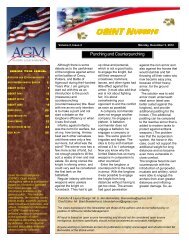Open Source Intelligence (OSINT) Link Directory - Allsource Global ...
Open Source Intelligence (OSINT) Link Directory - Allsource Global ...
Open Source Intelligence (OSINT) Link Directory - Allsource Global ...
You also want an ePaper? Increase the reach of your titles
YUMPU automatically turns print PDFs into web optimized ePapers that Google loves.
Creative Commons Copyright © Ben Benavides—no commercial exploitation without contract<br />
* 4 billion – Photos hosted by Flickr (October 2009).<br />
* 2.5 billion – Photos uploaded each month to Facebook.<br />
* 30 billion – At the current rate, the number of photos uploaded to Facebook per year.<br />
Videos<br />
* 1 billion – The total number of videos YouTube serves in one day.<br />
* 12.2 billion – Videos viewed per month on YouTube in the US (November 2009).<br />
* 924 million – Videos viewed per month on Hulu in the US (November 2009).<br />
* 182 – The number of online videos the average Internet user watches in a month (USA).<br />
* 82% – Percentage of Internet users that view videos online (USA).<br />
* 39.4% – YouTube online video market share (USA).<br />
* 81.9% – Percentage of embedded videos on blogs that are YouTube videos.<br />
Web browsers<br />
* 62.7% – Internet Explorer<br />
* 24.6% – Firefox<br />
* 4.6% – Chrome<br />
* 4.5% – Safari<br />
* 2.4% – Opera<br />
* 1.2% – Other<br />
Malicious software<br />
* 148,000 – New zombie computers created per day (used in botnets for sending spam, etc.)<br />
* 2.6 million – Amount of malicious code threats at the start of 2009 (viruses, trojans, etc.)<br />
* 921,143 – The number of new malicious code signatures added by Symantec in Q4 2009.<br />
(<strong>Source</strong>: http://hadoop-karma.blogspot.com/2010/03/how-much-data-is-generated-on-internet.html)<br />
Megabytes, Gigabytes, Terabytes... What Are They?<br />
These terms are usually used in the world of computing to describe disk space, or data storage space,<br />
and system memory. For instance, just a few years ago we were describing hard drive space using the<br />
term Megabytes. Today, Gigabytes is the most common term being used to describe the size of a hard<br />
drive. In the not so distant future, Terabyte will be a common term. But what are they? This is where it<br />
gets quite confusing because there are at least three accepted definitions of each term.<br />
According to the IBM Dictionary of computing, when used to describe disk storage capacity, a megabyte<br />
is 1,000,000 bytes in decimal notation. But when the term megabyte is used for real and virtual storage,<br />
and channel volume, 2 to the 20th power or 1,048,576 bytes is the appropriate notation. According to the<br />
Microsoft Press Computer Dictionary, a megabyte means either 1,000,000 bytes or 1,048,576 bytes.<br />
According to Eric S. Raymond in The New Hacker's Dictionary, a megabyte is always 1,048,576 bytes on<br />
the argument that bytes should naturally be computed in powers of two. So which definition do most<br />
people conform to?<br />
When referring to a megabyte for disk storage, the hard drive manufacturers use the standard that a<br />
megabyte is 1,000,000 bytes. This means that when you buy an 80 Gigabyte Hard drive you will get a<br />
total of 80,000,000,000 bytes of available storage. This is where it gets confusing because Windows uses<br />
the 1,048,576 byte rule so when you look at the Windows drive properties an 80 Gigabyte drive will report<br />
a capacity of 74.56 Gigabytes and a 250 Gigabyte drive will only yield 232 Gigabytes of available storage<br />
space. Anybody confused yet? With three accepted definitions, there will always be some confusion so I<br />
will try to simplify the definitions a little.<br />
The 1000 can be replaced with 1024 and still be correct using the other acceptable standards. Both of<br />
these standards are correct depending on what type of storage you are referring.<br />
24





